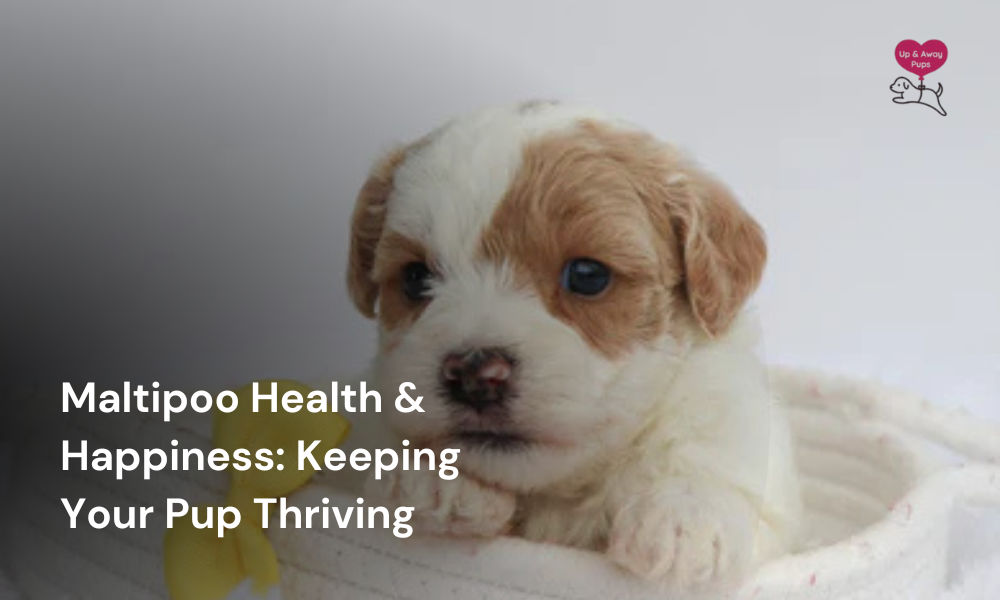Maltipoo Health & Happiness: Keeping Your Pup Thriving
Maltipoos are affectionate, intelligent, and playful companions known for their loving personalities. With proper care, they typically live long and healthy lives of 12–15 years. While they may face common small-breed health concerns such as allergies, dental issues, or ear infections, most are easy to manage with preventative care, quality nutrition, and regular vet visits. At Up & Away Pups, Maltipoos are raised with a focus on health, temperament, and early training, ensuring families enjoy years of joy, cuddles, and unconditional love.
Maltipoos are one of the most lovable and joyful designer breeds, adored for their affectionate personality, intelligence, and playful charm. While they may face a few potential health concerns, the great news is that most Maltipoos live long, healthy, and happy lives often 12–15 years or more when they come from responsible breeders and receive the right care.
At Up & Away Pups, every Maltipoo is raised in a caring environment with a focus on health, temperament, and early training. So families can enjoy years of love, cuddles, and companionship.
Common Maltipoo Health Considerations (and Why You Don’t Need to Worry)
Like all breeds, Maltipoos may be more prone to certain conditions. Here’s a look at a few that sometimes affect the breed and how they’re managed with ease when caught early.
Allergies & Sensitive Skin
Maltipoos can sometimes show mild skin sensitivities, often linked to food ingredients, grooming products, or environmental triggers like pollen. Signs may include itching, redness, or dry patches.
💡 Good to know:
These sensitivities are very manageable. Switching to a gentle, grain-free diet, using mild shampoos, and scheduling regular vet visits can make a big difference. Many Maltipoos never experience skin issues at all, and those who do often improve quickly with consistent care.
Dental Health
Because Maltipoos are a small breed, they can be more prone to plaque buildup and gum irritation. Left unchecked, this can affect their overall health.
💡 Prevention is simple:
Daily brushing, vet-recommended dental chews, and professional cleanings help keep their teeth sparkling. Responsible breeders also focus on strong dental genetics, which means many Maltipoos enjoy years of healthy smiles with just a little routine care.
Patellar Luxation (Knee Health)
Patellar luxation is a condition where the kneecap may shift out of place, something that occurs in many small dog breeds.
💡 Positive outlook:
Most Maltipoos with this condition still run, jump, and play happily. In mild cases, it often requires only lifestyle adjustments, like avoiding excessive jumping from high places. In more noticeable cases, simple veterinary procedures can resolve the issue and allow pups to return to full activity.
Ear Health
With their adorable floppy ears, Maltipoos can be slightly more prone to ear infections, especially if moisture builds up.
💡 Easily prevented:
Regular ear cleaning at home and occasional vet checkups keep ears healthy. Groomers can also help by trimming hair around the ear canal to improve airflow. With routine care, most Maltipoos go their whole lives without serious ear concerns.
Progressive Retinal Atrophy (PRA)
PRA is a genetic eye condition that can appear in some breeds, though it’s far from common.
💡 Reassurance:
Reputable breeders, like Up & Away Pups, carefully test parent dogs to minimise genetic risks. Most Maltipoos will never face PRA. Even if it does occur, dogs adapt incredibly well, relying on their sharp sense of smell and hearing to continue enjoying a normal, happy life.

If you’re considering getting a Maltipoo but also want to explore other options, you must be realistic about your expectations and what you can practically handle. You might find our comparison of Cockapoo vs. Maltipoo helpful. Both breeds are lovely pets, easy to train, and great for both families and individuals, but they vary in terms of their needs and health concerns.
How to Keep Your Maltipoo Healthy
Proactive and preventative care together will do wonders for the health of any living being, and dealing with Maltipoo diseases is no exception. Here are some tips:
• Make it a habit to perform annual checkups at the vet. All vaccinations must be provided, along with parasite prevention and routine bloodwork.
• You are what you eat, and the same goes for your Maltipoo. Stick to feeding them high-quality dog food or homemade meals with balanced nutrition. Overweight dogs may look adorable, but excess weight isn’t good for their long-term health. Weight management is crucial.
• Maltipoos aren’t lazy dogs, they love playtime and running. Ensure they get their daily dose of exercise, but avoid overexertion to protect their joints. Remember, mental stimulation, like solving dog-friendly puzzles, is also essential to keep their brains sharp; they are half Poodle, after all.
• The beautiful white fur of a Maltipoo must be regularly brushed to prevent matting and keep their coat healthy.
Conclusion
Maltipoos are generally healthy, loving companions that bring endless joy to their families. While they may have a few small-dog health considerations, most are easy to manage with preventive care, good nutrition, and regular vet visits. With the right attention, your Maltipoo can live a long, happy, and active life often well into their early to mid-teens.
Above all, what Maltipoos crave most is love, play, and connection. When you provide those along with basic health care, your pup will thrive and continue to brighten your days for many years to come.
FAQs
Q: How Often Should I Take My Maltipoo to the Vet?
A: It's recommended to schedule veterinary check-ups at least once a year for adult Maltipoos. Puppies and senior dogs may require more frequent visits to monitor their health closely.
Q: What Is the Average Lifespan of a Maltipoo?
A: Maltipoos typically live between 12 to 15 years, provided they receive proper care, nutrition, and regular veterinary attention.
Q: Are Maltipoos Hypoallergenic?
A: While no dog is entirely hypoallergenic, Maltipoos tend to shed less due to their Poodle lineage, making them more suitable for individuals with mild allergies.


